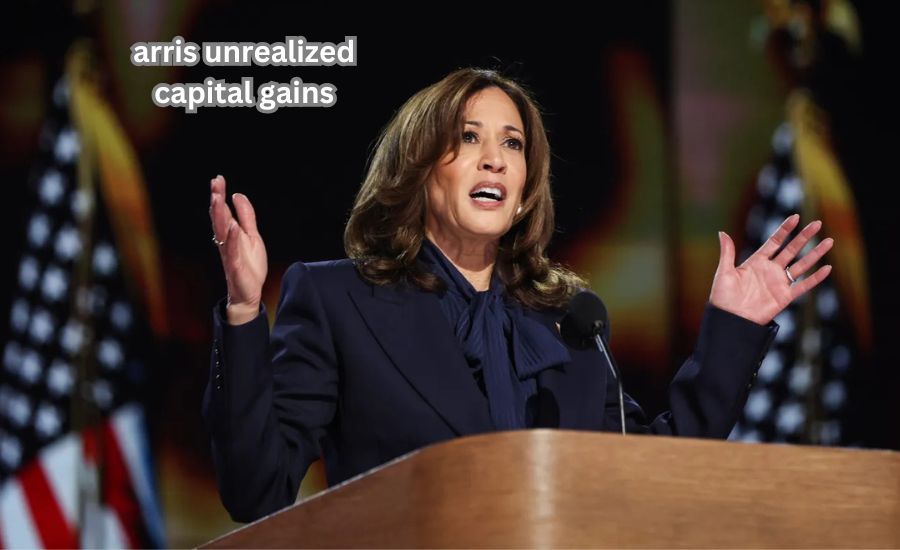The Kamala Harris unrealized capital gains tax proposal marks a bold shift in how wealth is taxed in the United States, targeting high net worth individuals with over $100 million in assets. Unlike traditional capital gains taxes that only apply when assets are sold, this policy taxes the growth in asset value each year, even if the gains aren’t realized through a sale. This minimum 25% tax on unrealized capital gains aims to address the wealth gap by ensuring that the ultra wealthy contribute more fairly based on their total wealth, not just income.
Proponents of Kamala Harris’s unrealized capital gains policy argue that it is a step toward economic fairness, as it could prevent the wealthiest Americans from avoiding taxes by holding onto their assets rather than selling them. Critics, however, believe this approach might discourage investment and create complex reporting requirements. As debates continue, this proposal could redefine the relationship between wealth and taxes in America, reshaping the country’s economic landscape.
Kamala Harris Unrealized Capital Gains: Understanding the Proposal
The Kamala Harris unrealized capital gains tax is a proposed policy designed to tax the wealthy on the gains made by their assets, even if those gains are not realized through sale. The proposal targets individuals with assets over $100 million, aiming to close the wealth gap and make the tax system more equitable. Currently, many wealthy individuals avoid paying taxes on gains from their investments until those assets are sold, which allows them to defer taxes indefinitely.
This new policy seeks to ensure that these wealthy individuals pay taxes on their accumulated wealth annually. While this could provide additional revenue for public services, it also raises concerns regarding how the tax would be implemented and whether it would discourage investment or economic growth.
Kamala Harris Unrealized Capital Gains: Key Features of the Tax Plan
The Kamala Harris unrealized capital gains tax plan would apply to those with assets worth over $100 million. It would impose taxes on the increase in value of their holdings, including stocks, bonds, and real estate. The tax rate under this plan would be 25%, levied annually on the unrealized gains of these assets, rather than waiting until they are sold. This would impact the wealthiest individuals who have large amounts of wealth tied up in appreciating assets, preventing them from avoiding taxes indefinitely.
Supporters argue that this policy is essential for creating a more fair tax system, ensuring that the ultra wealthy pay their fair share. However, critics have raised concerns about its potential to reduce economic incentives and create administrative challenges for both taxpayers and the IRS.
Kamala Harris Unrealized Capital Gains: Impact on Wealth Inequality
The Kamala Harris unrealized capital gains tax has the potential to reduce wealth inequality in the United States. The wealthiest Americans often accumulate large amounts of wealth through investments, which grow over time without being taxed until the assets are sold. By taxing unrealized gains, this proposal would require the rich to pay taxes based on the growth of their wealth, making the tax system more progressive.
This proposal is part of a larger effort to reduce the wealth gap between the richest Americans and the middle class. Supporters believe that taxing the gains of billionaires could help fund programs aimed at addressing poverty and providing more resources to those in need. However, opponents argue that the tax might have unintended economic consequences.
Kamala Harris Unrealized Capital Gains: How It Would Work in Practice
In practice, the Kamala Harris unrealized capital gains tax would require wealthy individuals to report the appreciation of their assets each year. This would be challenging for assets like real estate or private investments, which may not have a clear market value. Under the proposed system, individuals would be taxed on the increase in value of these assets, paying an annual 25% tax on those gains, even if the assets were not sold.
There are concerns that calculating unrealized gains on non liquid assets could be difficult, especially if the market value is not easily determined. The logistics of enforcing such a tax could lead to disputes over asset valuation and raise questions about the feasibility of such a tax in practice.
Kamala Harris Unrealized Capital Gains: Taxing Billionaires’ Assets
One of the most talked about aspects of the Kamala Harris unrealized capital gains tax is its focus on the ultra wealthy. The tax would primarily target individuals with assets over $100 million, including billionaires who have built their fortunes on appreciating assets. This group of individuals often pays little to no tax on their wealth, as they do not need to sell their investments to access cash.
By taxing unrealized capital gains, this proposal aims to reduce the gap between the rich and the rest of the population. It is argued that the wealthy should contribute more to government revenues, given that they disproportionately benefit from the economic system.
Kamala Harris Unrealized Capital Gains: Challenges of Implementation
The Kamala Harris unrealized capital gains tax faces significant challenges in terms of implementation. One major issue is how to accurately value assets that do not have a liquid market, such as private investments or real estate. The IRS would need new systems and infrastructure to track these assets and their growth in value, which could be a monumental task.
Additionally, there is concern about how individuals would handle their tax liabilities, especially if the value of their assets fluctuates. Some argue that this could lead to disputes over asset valuations and create significant administrative hurdles.
Kamala Harris Unrealized Capital Gains: Potential Economic Consequences
The Kamala Harris unrealized capital gains tax could have significant economic consequences, particularly for investors. By taxing unrealized gains, wealthy individuals might be forced to sell some of their assets to meet their tax obligations. This could create market instability and discourage long term investments. Additionally, some worry that it could discourage entrepreneurs from building businesses or making long term investments in the economy.
Despite these concerns, supporters of the proposal argue that it could lead to a fairer economy by ensuring that the wealthy contribute more to public services. The real challenge is balancing the potential economic disruption with the need for greater wealth redistribution.
Kamala Harris Unrealized Capital Gains: Public Reaction and Debate
The Kamala Harris unrealized capital gains tax has sparked widespread debate, with both strong support and strong opposition. Progressive groups have praised the policy as a necessary step toward reducing wealth inequality, while conservative groups have criticized it as overly intrusive and damaging to economic growth. Public opinion on the proposal is mixed, with many Americans expressing concern about its potential impact on investment and the economy.
The debate continues to evolve as more details of the proposal are discussed. Some believe that the tax could be a game changer in reducing the wealth gap, while others fear it could lead to unintended consequences.
Kamala Harris Unrealized Capital Gains: Comparisons with Other Countries
The Kamala Harris unrealized capital gains tax has drawn comparisons with similar policies in other countries. Some European nations, such as Norway and Switzerland, have implemented wealth taxes targeting the ultra wealthy. However, these taxes have faced challenges in implementation and enforcement. The U.S. proposal differs in that it specifically targets unrealized gains, rather than a tax on overall wealth.
While the idea of taxing unrealized capital gains is relatively new in the U.S., other countries’ experiences may provide valuable lessons on how to implement and enforce such a policy. Looking at these examples can help policymakers understand the potential pitfalls and benefits of such a tax.
Kamala Harris Unrealized Capital Gains: The Potential Impact on Small Businesses
The Kamala Harris unrealized capital gains tax could have significant effects on small businesses, particularly those owned by wealthy individuals. By taxing the unrealized gains in businesses, owners may be forced to sell off portions of their companies to cover the tax bill. This could reduce the number of privately held businesses in the U.S. and could have a negative effect on job creation and economic growth.
Small business owners may also face additional challenges in calculating the unrealized gains on their businesses and reporting them to the IRS. This could lead to confusion and complexity in managing taxes for their businesses.
Things You Have To Know: Betsy-berardi
Kamala Harris Unrealized Capital Gains: The IRS and Enforcement Challenges
Enforcing the Kamala Harris unrealized capital gains tax would require a major overhaul of the IRS’s operations. The IRS would need to develop systems for tracking the value of non liquid assets, such as real estate and private investments, which could be difficult and time consuming. Furthermore, there would be challenges in accurately determining the value of assets each year, which could lead to disputes over tax liability.
The potential for errors in calculating unrealized gains could lead to costly audits and legal challenges. The IRS would need to ensure that these issues are addressed before the tax can be fully implemented.
Kamala Harris Unrealized Capital Gains: Tax Reform and Future Implications
The Kamala Harris unrealized capital gains tax could serve as a foundation for broader tax reform in the U.S. If successful, it may prompt further discussions about wealth taxes and the taxation of capital. Other ideas, such as expanding the estate tax or creating new tax brackets for the wealthy, could emerge as part of the conversation on tax fairness.
The future implications of such a tax are still unclear, as it would require significant political support and careful implementation to ensure it achieves its intended goals. However, it could lead to a major shift in how wealth is taxed in the U.S.
Kamala Harris Unrealized Capital Gains: A Way to Address Wealth Inequality
The Kamala Harris unrealized capital gains tax is one of several proposals aimed at reducing wealth inequality in the U.S. Wealth inequality has reached historic levels, with a small percentage of the population controlling most of the nation’s wealth. This tax is seen as a way to ensure that the wealthiest individuals contribute more to the country’s financial needs, which could help provide more resources for education, healthcare, and other public services.
Proponents argue that the tax will help reduce the gap between the rich and the rest of the population, making the U.S. a fairer society. However, opponents worry that it could lead to economic challenges and create unintended consequences.
Kamala Harris Unrealized Capital Gains: Potential Effects on Retirement Savings
The Kamala Harris unrealized capital gains tax could also affect retirement savings, especially for wealthy individuals who rely heavily on their investments to fund their retirement. For example, many individuals invest in stocks and other assets with the expectation that their wealth will grow over time without immediate tax burdens. The tax would change this dynamic, requiring these individuals to pay annual taxes on unrealized gains, potentially impacting their retirement plans.
While the proposal primarily targets the wealthiest individuals, middle class investors with significant assets could also feel the effects, particularly if their investments grow significantly over time. Retirement accounts such as IRAs or 401(k)s may be impacted depending on how the tax is applied, which could create concern among those who rely on long term growth for their retirement security.
Kamala Harris Unrealized Capital Gains: What It Means for the Future of Wealth Distribution
The Kamala Harris unrealized capital gains tax is part of a broader conversation about the future of wealth distribution in the U.S. As wealth inequality continues to rise, many argue that reforms like the unrealized capital gains tax are necessary to ensure a more equitable society. This tax would target individuals with large, appreciating assets who have been able to amass significant wealth without paying taxes on that growth, often for many years.
By taxing unrealized gains, the U.S. could shift closer to a more progressive tax system, where the wealthiest individuals are expected to contribute more to the economy. If successful, this could serve as a model for other countries and even inspire further reform in U.S. tax policy. However, the full implications of such a tax remain to be seen, particularly in terms of how it will be implemented and how it will affect wealth creation and distribution in the future.
Conclusion
The Kamala Harris unrealized capital gains proposal aims to address wealth inequality by targeting untaxed gains among the wealthiest Americans. By taxing these unrealized gains, it seeks to ensure that the rich contribute more fairly to public funds, even on investments that have grown but haven’t been sold. Supporters see this as a step toward closing the gap between the wealthy and middle income groups, helping to create a fairer tax system. However, critics warn that this tax could discourage investment or lead wealthy individuals to find ways to avoid paying it, potentially impacting economic growth.
As the debate continues, this proposal brings up essential questions about fairness in taxation and how best to ensure everyone pays their fair share. The future of the Kamala Harris unrealized capital gains tax depends on its acceptance by Congress and the public. If implemented with care, it could make the tax system more balanced, but it will be crucial to address any economic concerns to build a policy that benefits all parts of society.
Read You Have To Know: Juanita-katt
FAQs
What is the Kamala Harris unrealized capital gains tax?
The Kamala Harris unrealized capital gains tax proposal targets gains on investments that have increased in value but haven’t been sold. This would apply primarily to wealthy individuals.
Why is the Kamala Harris unrealized capital gains tax proposed?
The Kamala Harris unrealized capital gains tax is proposed to ensure the wealthiest Americans contribute fairly, as many avoid taxes by not selling their investments.
Who would pay the Kamala Harris unrealized capital gains tax?
The Kamala Harris unrealized capital gains tax would apply to individuals with assets over a certain threshold, mainly targeting billionaires and multimillionaires.
How does Kamala Harris’s unrealized capital gains tax work?
The Kamala Harris unrealized capital gains tax would impose a tax rate on the value increase of assets yearly, even if they are not sold.
Could the Kamala Harris unrealized capital gains tax affect middle class investors?
Generally, the Kamala Harris unrealized capital gains tax is aimed at the ultra wealthy, so typical middle class investors would not be affected.
What are the pros of the Kamala Harris unrealized capital gains tax?
A potential benefit of the Kamala Harris unrealized capital gains tax is reducing wealth inequality by ensuring the rich pay taxes on their growing assets.
What are the criticisms of the Kamala Harris unrealized capital gains tax?
Some critics argue that the Kamala Harris unrealized capital gains tax might discourage investment and create challenges in accurately valuing assets annually.
How would the IRS manage the Kamala Harris unrealized capital gains tax?
If implemented, the IRS would need new systems to track the Kamala Harris unrealized capital gains tax, monitoring wealth changes yearly.
Will the Kamala Harris unrealized capital gains tax become law?
The Kamala Harris unrealized capital gains tax is still a proposal, and it would need approval from Congress to be enacted into law.
Could the Kamala Harris unrealized capital gains tax impact economic growth?
Some believe the Kamala Harris unrealized capital gains tax might affect economic growth if high earners reduce investments to avoid the tax.

Jennifer David is the creative force behind CelebRiches, your go-to source for celebrity financial exploits. With an unwavering passion for the entertainment industry, she delivers in-depth insights into celebrities’ net worth, combining thorough research with a captivating narrative. Explore the stars’ fiscal journeys through Jennifer’s expert lens, where finance meets fame most engagingly.

